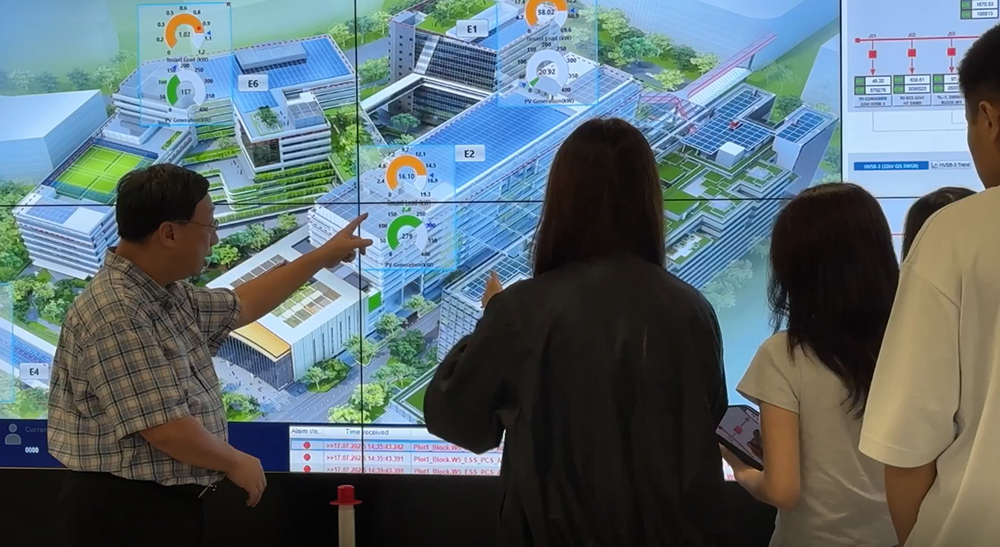
Course Overview
PDU (PEB) – Pending approval
This module is part of an updated learning pathway stackable towards a Graduate Certificate in Electrical Engineering Professional Practices and SIT’s Master of Science in Electrical and Electronic Engineering.
This module aims to provide students with in-depth knowledge and competency in power system fault analysis and protection system design and operation to ensure power system reliability and safety.
Lessons will be delivered in a technology-enabled learning mode using industry-standard electrical power system analysis and operation simulation software. The module will focus on fault analysis of power systems, operating principles of protection devices and circuits, and protection of power systems.
This module, worth 6 European Credit Transfer and Accumulation System (ECTS) credits, is taken concurrently as part of the Graduate Certificate in Electrical Engineering Professional Practices, which comprises three modules. The certificate can also serve as a pathway to the Master of Science in Electrical and Electronic Engineering.
Who Should Attend
- Engineers working in power and energy sector
- Electrical and electronic engineering professionals
- Researchers and educators in electrical engineering and urban sustainability-related areas
- Fresh engineering graduates who are preparing to sit for the fundamentals of engineering exam (FEE) for registration as a professional engineer to the Professional Engineers Board (PEB)
Prerequisites
- Bachelor degree in Engineering
- At least one-year of relevant working experience
What You Will Learn
Modelling of fundamental power grid components
- Common models in ETAP, busbars, cables
- Current and voltage transformers, two and three-winding transformers
- Generators and motors, circuit breakers and protection relays
Power system fault analysis
- Protection requirements and principles
- Theory and application of symmetrical components
- Different types and effects of faults
- Symmetrical and unsymmetrical fault calculation methods
- Symmetrical and unsymmetrical fault simulation studies and analysis in ETAP
Protective devices, transducers and components
- Types and characteristics of relays and their applications
- Hands-on practical experience in setting relays and secondary injection tests for relays
- Current and voltage transformers
- Types and characteristics of fuses
- Types and characteristics of circuit breakers and their applications
Power system protection
- Protection of cables, lines, transformers, switchgear, generators and motors
- Coordination requirements and discrimination settings
- Earthing for electrical safety and power system protection
- Protective device coordination/selectivity and sequence-of-operation fault analysis in ETAP
Teaching Team

Tan Kuan Tak
Associate Professor, Engineering, Singapore Institute of Technology
Schedule
| Course Run | Dates | Time |
|---|---|---|
| September – November 2024 Run | 3 September – 26 November 2024 (Every Tuesday*) | 7:00 pm – 10:00 pm |
*Subject to change
Certificate and Assessment
A Certificate of Attainment will be issued to participants who:
- Attend at least 75% of each module, and
- Undertake and pass credit-bearing assessment during the module
- Participants will be awarded a Graduate Certificate in Electrical Engineering Professional Practice if they complete all three modules (totalling 18 credits) with a Cumulative Grade Point Average (CGPA) of 2.0
- The GCert is stackable towards SIT’s Master of Science in Electrical and Electronic Engineering (MSc EEE), and candidates who attain a CGPA of 2.5 or above may apply for transfer to the MSc EEE programme
Participants who meet the attendance requirement but do not pass the assessment will receive a Certificate of Participation.
Fee Structure
The full fee for this course is S$3,606.88
| Category | After SF Funding |
|---|---|
| Singapore Citizen (Below 40) | S$1,082.06 |
| Singapore Citizen (40 & Above) | S$420.25 |
| Singapore PR / LTVP+ Holder | S$1,082.06 |
| Non-Singapore Citizen | S$3,606.88 (No Funding) |
Note: All fees above include GST. GST applies to individuals and Singapore-registered companies.
Course Runs
Learning Pathway

Earn a Postgraduate Certificate
New Engineering Micro-credentials Launching Soon!
Exciting news! We are introducing new micro-credentials in Electrical and Electronic Engineering & Infrastructure and Systems Engineering. Be among the first to know by registering your interest today! Register now →











